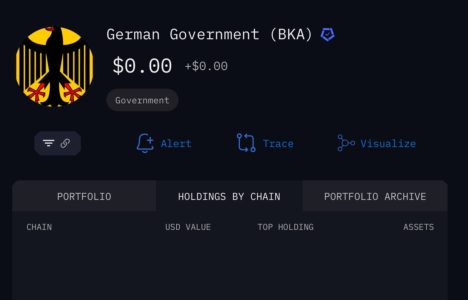Hold onto your hats, crypto enthusiasts! A major player has just made a significant move in the Bitcoin world. The German government, after weeks of strategic selling, has officially emptied its Bitcoin wallets. Yes, you read that right – Germany now holds zero Bitcoins.
The Final Move: 3846 BTC Sent Packing
In the latest and final chapter of this crypto saga, a substantial 3846 Bitcoin, valued at a whopping $223.81 million, was transferred out of government-controlled wallets. Where did it go? Blockchain sleuths have pointed to prominent entities in the trading world: Flow Traders and 139Po. This marks the culmination of a series of sales that saw over 46,000 BTC leave German government hands.
To put it in perspective, imagine selling off all your digital gold reserves. That’s essentially what Germany has done with its Bitcoin stash. This isn’t just pocket change; we’re talking about a massive amount of cryptocurrency moving in the market.
Bitcoin Sell-Off Timeline: A Market Rollercoaster
This wasn’t a sudden dump. The German government’s Bitcoin sell-off has been a weeks-long process, and it’s safe to say it hasn’t gone unnoticed by the crypto market. In fact, many analysts believe this consistent selling pressure played a significant role in keeping Bitcoin’s price in check, preventing it from breaking past the psychological $60,000 barrier.
Think about it like this:
- Consistent Supply Increase: Imagine a steady stream of new Bitcoin entering the market from government sales. This increased supply can naturally temper buying pressure.
- Market Sentiment: Large government sales can sometimes create uncertainty or fear in the market, leading to cautious trading and potentially suppressing price increases.
For weeks, the question on everyone’s mind was: When will it end? And more importantly, what happens after?
Is the Bitcoin Downtrend Over? Signs of Potential Recovery
Now that the German government’s Bitcoin holdings are reportedly at zero, the big question is: Are we finally seeing the end of this sell-off induced downtrend? Early indicators suggest we might be.
Here’s why there’s a glimmer of optimism:
- Reduced Selling Pressure: With the major seller out of the picture, a significant source of downward pressure on Bitcoin price has been removed.
- Market Relief: The crypto market often reacts positively to the removal of uncertainty. The end of the sell-off could signal a period of relief and renewed buying interest.
- Price Uptick: As of now, Bitcoin is showing signs of life, with a 0.91% increase in the last 24 hours, currently trading around $58,236.12. While a single day’s movement isn’t definitive proof, it’s a positive signal.
However, it’s crucial to remember that the crypto market is influenced by a multitude of factors. While the end of the German sell-off is a significant development, other elements like macroeconomic conditions, regulatory news, and overall market sentiment will continue to play a crucial role in Bitcoin’s price trajectory.

Flow Traders and 139Po: Key Players in the Bitcoin Ecosystem
The movement of the final 3846 BTC to entities like Flow Traders and 139Po shines a light on the interconnectedness of the crypto market. Let’s take a quick look at who these players are:
- Flow Traders: A well-known global liquidity provider in the financial markets, including digital assets. They play a crucial role in ensuring smooth trading and efficient price discovery in crypto exchanges. Their involvement suggests the Bitcoin may be intended for broader market circulation and trading activities.
- 139Po: While less publicly prominent than Flow Traders, 139Po is also likely involved in cryptocurrency trading and market making. Further details about their specific role in this transaction would require more in-depth blockchain analysis.
The involvement of these entities indicates that the German government’s Bitcoin wasn’t simply moved to cold storage. It’s actively participating in the crypto ecosystem, likely being used for trading, market making, or other financial activities.
What Does This Mean for You? Key Takeaways
So, what can we learn from this significant Bitcoin event?
- Government Impact on Crypto Markets: This episode underscores the potential impact of government actions on cryptocurrency prices. Large-scale holdings and sales by governments can indeed influence market trends.
- Market Resilience: Despite the weeks-long sell-off, Bitcoin has shown resilience. The price didn’t crash, and now there are signs of potential recovery. This highlights the underlying strength and growing maturity of the Bitcoin market.
- Monitor On-Chain Data: Tracking large wallet movements and on-chain data can provide valuable insights into market dynamics and potential price shifts. The initial reports of German government selling came from observing these very transactions.
- Crypto Market is Dynamic: The crypto market is constantly evolving. Events like this German sell-off are reminders of the various factors that can influence prices and the importance of staying informed and adaptable.
In Conclusion: A New Chapter for Bitcoin?
The German government’s Bitcoin sell-off saga appears to be over. The market now looks ahead to a potentially less constrained Bitcoin price environment. While the immediate impact might be positive, the long-term trajectory of Bitcoin will depend on a complex interplay of factors. Keep an eye on market movements, stay informed, and remember that in the world of crypto, things can change quickly. Is this the start of Bitcoin’s next bull run? Only time will tell, but the removal of this significant selling pressure is undoubtedly a noteworthy development in the ongoing Bitcoin story.
Disclaimer: The information provided is not trading advice, Bitcoinworld.co.in holds no liability for any investments made based on the information provided on this page. We strongly recommend independent research and/or consultation with a qualified professional before making any investment decisions.


